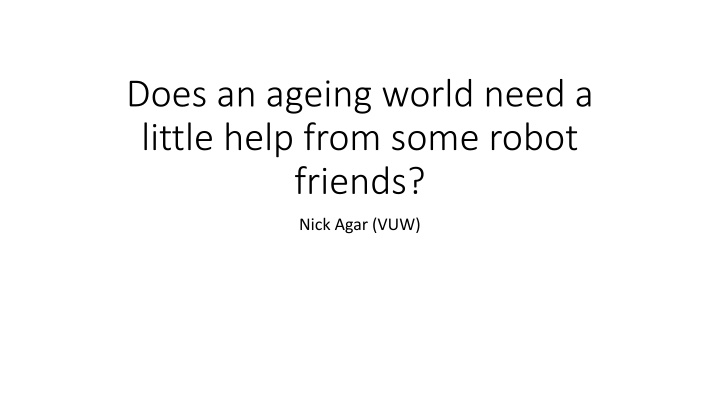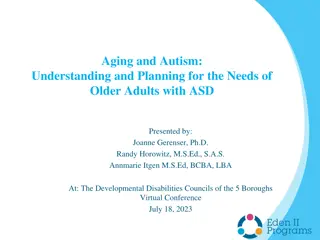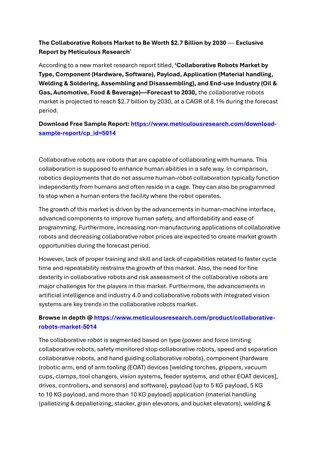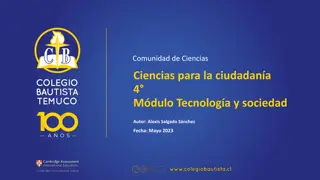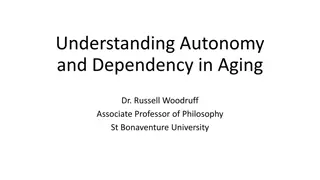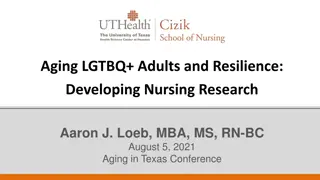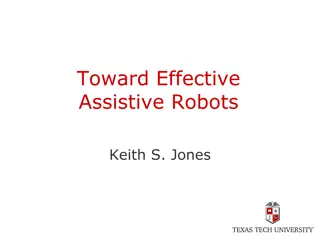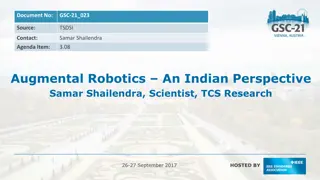Exploring the Role of Robots in Addressing Social Needs in an Aging World
As the world population ages, questions arise about the potential of robots to fill social roles traditionally held by humans. This discussion delves into whether machines can be considered friends or companions and the ethical considerations involved. It advocates for human-centered solutions to combat social isolation and urges caution in relying on machines for social interactions.
Download Presentation

Please find below an Image/Link to download the presentation.
The content on the website is provided AS IS for your information and personal use only. It may not be sold, licensed, or shared on other websites without obtaining consent from the author.If you encounter any issues during the download, it is possible that the publisher has removed the file from their server.
You are allowed to download the files provided on this website for personal or commercial use, subject to the condition that they are used lawfully. All files are the property of their respective owners.
The content on the website is provided AS IS for your information and personal use only. It may not be sold, licensed, or shared on other websites without obtaining consent from the author.
E N D
Presentation Transcript
Does an ageing world need a little help from some robot friends? Nick Agar (VUW)
More that one philosophically interesting question [1] Could a machine satisfy philosophical criteria to be a friend (or companion or comrade or )? [2] Should we take steps to discourage a transition to a world in which machines fill many relationship roles? My answers [1] Don t know [2] Yes
The ethical long view Take the ethical long view: think about whether a change will leave us better off overall How to be Human in the Digital Economy (MIT Press, 2019) Conclusion: We should expect machines that fill social roles to disappoint our expectations. Discourage their development regardless of how you answer 1. Seek human solutions for human social problems. Combat the epidemic of social isolation.
Dont be overconfident! Adopt an insurance mindset to the challenges of the future. Avoid overconfidence both about technological forecasts and about philosophical conclusions.
The lonely misanthrope Implications of doubt about whether a robot satisfies the criteria to be a friend, companion, or comrade. The lonely misanthrope Can we satisfy the lonely misanthrope while conforming to a long view expectation that humans should fill relationship roles for humans? Relationship robots as methadone.
A suggestion from Michael Walzer Michael Walzer s use of the doctrine of double effect in Just War Theory. The intention of the actor is good, that is, he aims narrowly at the acceptable effect; the evil effect is not one of his ends, nor is it a means to his ends, and, aware of the evil involved, he seeks to minimize it, accepting costs himself. (Michael Walzer, Just and Unjust Wars, 2ndedition, p. 155) Two intentions Two intentions about computers in relationship roles Give the lonely misanthrope a machine that comes as close as possible to satisfying the philosophical criteria for friendship but take steps to discourage the spread of machines into relationship roles.
Speculating about computers in relationship roles Criticizing the sharing economy at its outset Poor quality jobs are not an intrinsic feature of the sharing economy. But they are predictable. The insurance mindset suggests that advocates of the sharing economy need a second intention to prevent their eventuality.
Over-engineered relationship robots We can expect that computers in relationship roles will systematically disappoint our expectations. A conjecture about us Hyperactive Agency Detectors Those who make digital friends/companions/comrades know we are satisfied by that machines that don t maximally satisfy criteria for relationship roles. Sex robots, robot carers. Either change the way that we pay for relationship robots or do without them.
